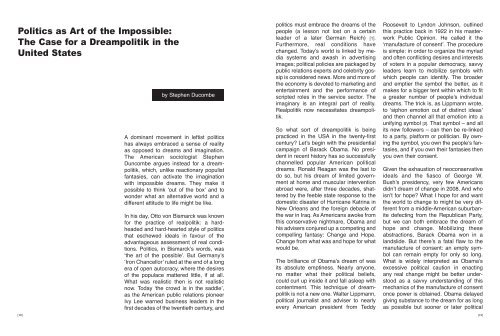Download pdf version of issue no. 16 (4 Mb) - Pavilion
Download pdf version of issue no. 16 (4 Mb) - Pavilion
Download pdf version of issue no. 16 (4 Mb) - Pavilion
Create successful ePaper yourself
Turn your PDF publications into a flip-book with our unique Google optimized e-Paper software.
Politics as Art <strong>of</strong> the Impossible:<br />
The Case for a Dreampolitik in the<br />
United States<br />
[18]<br />
by Stephen Ducombe<br />
A dominant movement in leftist politics<br />
has always embraced a sense <strong>of</strong> reality<br />
as opposed to dreams and imagination.<br />
The American sociologist Stephen<br />
Duncombe argues instead for a dreampolitik,<br />
which, unlike reactionary populist<br />
fantasies, can activate the imagination<br />
with impossible dreams. They make it<br />
possible to think ‘out <strong>of</strong> the box’ and to<br />
wonder what an alternative world and a<br />
different attitude to life might be like.<br />
In his day, Otto von Bismarck was k<strong>no</strong>wn<br />
for the practice <strong>of</strong> realpolitik: a hardheaded<br />
and hard-hearted style <strong>of</strong> politics<br />
that eschewed ideals in favour <strong>of</strong> the<br />
advantageous assessment <strong>of</strong> real conditions.<br />
Politics, in Bismarck’s words, was<br />
‘the art <strong>of</strong> the possible’. But Germany’s<br />
‘Iron Chancellor’ ruled at the end <strong>of</strong> a long<br />
era <strong>of</strong> open autocracy, where the desires<br />
<strong>of</strong> the populace mattered little, if at all.<br />
What was realistic then is <strong>no</strong>t realistic<br />
<strong>no</strong>w. Today ‘the crowd is in the saddle’,<br />
as the American public relations pioneer<br />
Ivy Lee warned business leaders in the<br />
first decades <strong>of</strong> the twentieth century, and<br />
politics must embrace the dreams <strong>of</strong> the<br />
people (a lesson <strong>no</strong>t lost on a certain<br />
leader <strong>of</strong> a later German Reich) [1].<br />
Furthermore, real conditions have<br />
changed. Today’s world is linked by media<br />
systems and awash in advertising<br />
images; political policies are packaged by<br />
public relations experts and celebrity gossip<br />
is considered news. More and more <strong>of</strong><br />
the eco<strong>no</strong>my is devoted to marketing and<br />
entertainment and the performance <strong>of</strong><br />
scripted roles in the service sector. The<br />
imaginary is an integral part <strong>of</strong> reality.<br />
Realpolitik <strong>no</strong>w necessitates dreampolitik.<br />
So what sort <strong>of</strong> dreampolitik is being<br />
practiced in the USA in the twenty-first<br />
century? Let’s begin with the presidential<br />
campaign <strong>of</strong> Barack Obama. No president<br />
in recent history has so successfully<br />
channelled popular American political<br />
dreams. Ronald Reagan was the last to<br />
do so, but his dream <strong>of</strong> limited government<br />
at home and muscular intervention<br />
abroad were, after three decades, shattered<br />
by the feeble state response to the<br />
domestic disaster <strong>of</strong> Hurricane Katrina in<br />
New Orleans and the foreign debacle <strong>of</strong><br />
the war in Iraq. As Americans awoke from<br />
this conservative nightmare, Obama and<br />
his advisers conjured up a competing and<br />
compelling fantasy: Change and Hope.<br />
Change from what was and hope for what<br />
would be.<br />
The brilliance <strong>of</strong> Obama’s dream <strong>of</strong> was<br />
its absolute emptiness. Nearly anyone,<br />
<strong>no</strong> matter what their political beliefs,<br />
could curl up inside it and fall asleep with<br />
contentment. This technique <strong>of</strong> dreampolitik<br />
is <strong>no</strong>t a new one. Walter Lippmann,<br />
political journalist and adviser to nearly<br />
every American president from Teddy<br />
Roosevelt to Lyndon Johnson, outlined<br />
this practice back in 1922 in his masterwork<br />
Public Opinion. He called it the<br />
‘manufacture <strong>of</strong> consent’. The procedure<br />
is simple: in order to organize the myriad<br />
and <strong>of</strong>ten conflicting desires and interests<br />
<strong>of</strong> voters in a popular democracy, savvy<br />
leaders learn to mobilize symbols with<br />
which people can identify. The broader<br />
and emptier the symbol the better, as it<br />
makes for a bigger tent within which to fit<br />
a greater number <strong>of</strong> people’s individual<br />
dreams. The trick is, as Lippmann wrote,<br />
to ‘siphon emotion out <strong>of</strong> distinct ideas’<br />
and then channel all that emotion into a<br />
unifying symbol [2]. That symbol – and all<br />
its new followers – can then be re-linked<br />
to a party, platform or politician. By owning<br />
the symbol, you own the people’s fantasies,<br />
and if you own their fantasies then<br />
you own their consent.<br />
Given the exhaustion <strong>of</strong> neoconservative<br />
ideals and the fiasco <strong>of</strong> George W.<br />
Bush’s presidency, very few Americans<br />
didn’t dream <strong>of</strong> change in 2008. And who<br />
isn’t for hope? What I hope for and want<br />
the world to change to might be very different<br />
from a middle-American suburbanite<br />
defecting from the Republican Party,<br />
but we can both embrace the dream <strong>of</strong><br />
hope and change. Mobilizing these<br />
abstractions, Barack Obama won in a<br />
landslide. But there’s a fatal flaw to the<br />
manufacture <strong>of</strong> consent: an empty symbol<br />
can remain empty for only so long.<br />
What is widely interpreted as Obama’s<br />
excessive political caution in enacting<br />
any real change might be better understood<br />
as a savvy understanding <strong>of</strong> this<br />
mechanics <strong>of</strong> the manufacture <strong>of</strong> consent<br />
once power is obtained. Obama delayed<br />
giving substance to the dream for as long<br />
as possible but sooner or later political<br />
[19]








